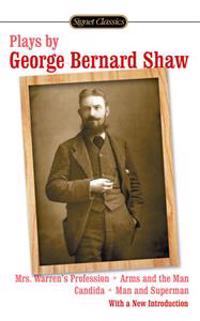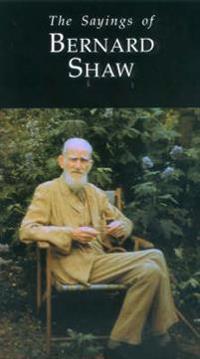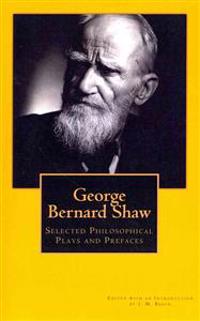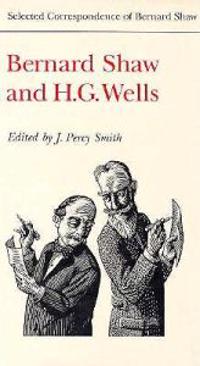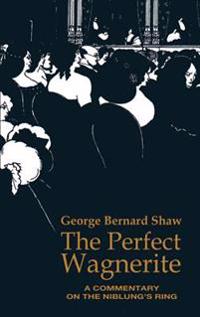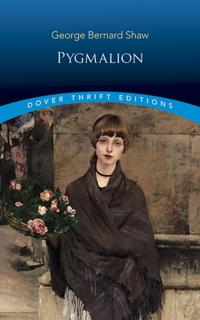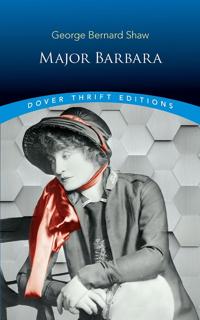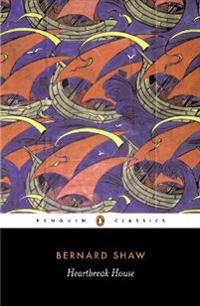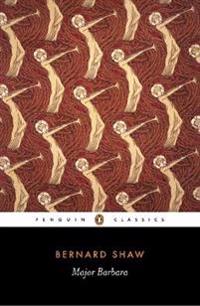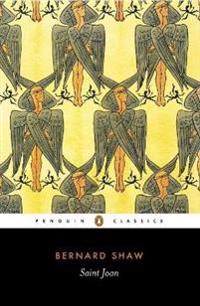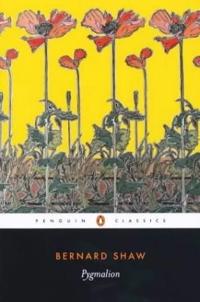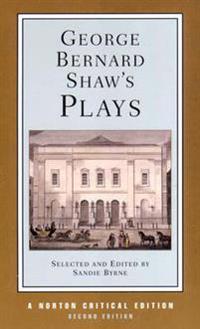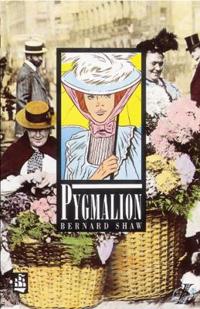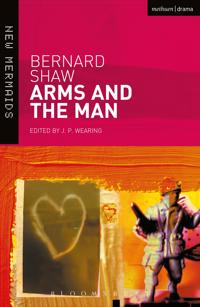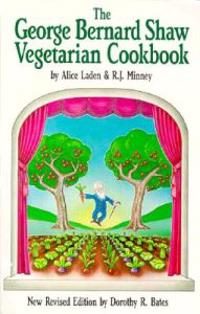Plays by George Bernard Shaw (Pocket)
avGeorge Bernard Shaw, Bernard Shaw, George Bernard
ISBN: 9780451529442 - UTGIVEN: 2004-08George Bernard Shaw demanded truth and despised convention. He punctured hollow pretensions and smug prudishness--coating his criticism with ingenious and irreverent wit. In "Mrs. Warren's Profession," " Arms and the Man," " Candida," and "Man and Superman," the great playwright satirizes society, m[...]
The Sayings of George Bernard Shaw (Häftad)
avGeorge Bernard Shaw
ISBN: 9780715624913 - UTGIVEN: 199511This series collects together the best-known aphorisms, epigrams and reflections of a wide variety of figures from antiquity to our own age: humorists and novelists, poets and philosophers, politicians and playwrights.[...]
George Bernard Shaw: Selected Plays and Prefaces (Häftad)
avGeorge Bernard Shaw, J. M. Beach
ISBN: 9781479194476 - UTGIVEN: 2012-08Foreword by Christopher Moore. Wonderful collection of the greatest and most popular plays of one of our finest playwrights. Includes Mrs. Warren's Profession, Arms and the Man, Caesar and Cleopatra, Man and Superman, Major Barbara, Androcles and the Lion, Heartbreak House, and the play on which the[...]
George Bernard Shaw, Collection Novels (Häftad)
avGeorge Bernard Shaw
ISBN: 9781500369330 - UTGIVEN: 2014-07Selected Correspondence of Bernard Shaw (Inbunden)
avGeorge Bernard Shaw, H. G. Wells
ISBN: 9780802030016 - UTGIVEN: 199505Bernard Shaw and H.G. Wells are among the best-known and most controversial literary figures of the twentieth century. Both were rebelliously critical of the social and political, familial and sexual conventions and structures of their time. They shared broadly similar interests, but their lifestyle[...]
The Perfect Wagnerite (Häftad)
avGeorge Bernard Shaw, Bernard Shaw
ISBN: 9780486217079 - UTGIVEN: 201007Pygmalion (Häftad)
avGeorge Bernard Shaw, Bernard Shaw
ISBN: 9780486282220 - UTGIVEN: 199410A rousing success on the London and New York stages, a popular film, and a great musical hit ("My Fair Lady"), this brilliantly written play, with its irresistible theme of the emerging butterfly, is one of the most acclaimed comedies in the English language. Includes Shaw's Preface and "Sequel."[...]
Major Barbara (Häftad)
avGeorge Bernard Shaw, Bernard Shaw, Dover Thrift Editions
ISBN: 9780486421261 - UTGIVEN: 200205Heartbreak House (Storpocket)
avGeorge Bernard Shaw
ISBN: 9780140437874 - UTGIVEN: 2000-06When Ellie Dunn joins a house-party at the home of the eccentric Captain Shotover, she causes a stir with her decision to marry for money rather than love, and the Captain's forthright daughter Hesione protests vigorously against the pragmatic young woman's choice. Opinion on the matter quickly divi[...]
Major Barbara (Storpocket)
avGeorge Bernard Shaw
ISBN: 9780140437904 - UTGIVEN: 200011Andrew Undershaft, a millionaire armaments manufacturer, loves money and despises poverty. His estranged daughter Barbara, on the other hand, shows her love for the poor by throwing her energies into her work as a Major in the Salvation Army, and sees her father as another soul to be saved. But when[...]
Saint Joan (Storpocket)
avGeorge Bernard Shaw
ISBN: 9780140437911 - UTGIVEN: 200101This is one of Shaw's most unusual and enduringly popular plays. With "Saint Joan" (1923) Shaw reached the height of his fame and Joan is one of his finest creations; forceful, vital, and rebelling against the values that surround her. The play distils Shaw's views on the subjects of politics, relig[...]
Androcles and the Lion (Storpocket)
avGeorge Bernard Shaw, Dan H. Laurence
ISBN: 9780140450132 - UTGIVEN: 1987-10"Androcles and the Lion" is a 1912 play written by George Bernard Shaw. "Androcles and the Lion" is Shaw's retelling of the tale of Androcles, a slave who is saved by the requited mercy of a lion. In the play, Shaw makes Androcles out to be one of many Christians being led to the Colosseum for tortu[...]
Plays Political (Storpocket)
avGeorge Bernard Shaw, Dan H. Laurence
ISBN: 9780140450309 - UTGIVEN: 1990-09While some of Shaw's earlier plays are still performed, his later plays, such as the ones in this volume, are barely known. As the collective title indicates, the themes here are political; yet, frankly, it is doubtful how seriously we can now take Shaw as a political thinker. Despite writing in the[...]
Pygmalion (Storpocket)
avGeorge Bernard Shaw
ISBN: 9780141439501 - UTGIVEN: 200301Professor Higgins succeeds in transforming an unkempt London flower girl into a society belle.
George Bernard Shaw's Plays
ISBN: 9780393977530 - UTGIVEN: 2002-05Each play is fully annotated. "Contexts and Criticism" features all-new material on the author and his work, from traditional critical readings to more theorized approaches, among them essays on Shaw's Fabianism and his alleged feminism. Contributors include Leon Hugo, Sally Peters, Tracy C. Davis, [...]
Pygmalion (Häftad)
avGeorge Bernard Shaw, Linda Cookson
ISBN: 9780582060159 - UTGIVEN: 199102"You see this creature with her kerbstone English Well sir, in three months I could pass that girl off as a duchess " So begins Henry Higgins' linguistic project to transform Eliza Dolittle's speech. But he hadn't bargained on Eliza's feisty character or falling in love with her[...]
St. Joan (Pocket)
avGeorge Bernard Shaw
ISBN: 9780582077867 - UTGIVEN: 1991-11-18Seventeen-year-old Joan of Arc is told by voices from God that she will drive the enemy English army from her beloved country and see the French king crowned at last. This peasant girl succeeds against all odds. Two years later, she is on trial for her life! The penalty will be death at the stake.[...]
George Bernard Shaw (CD-bok)
ISBN: 9780712305310 - UTGIVEN: 2006-09Bernard Shaw was one of the most celebrated English-language writers of the 20th century and a very prominent figure in the early years of radio in Britain.Fuelled by his determination to use radio to promote some of his more controversial views, Shaw made regular broadcasts over a period of almost [...]
Pygmalion (Häftad)
avGeorge Bernard Shaw
ISBN: 9780713679977 - UTGIVEN: 200805'Not bloody likely' Ever since Pygmalion opened in London in April 1914 it has proved a very controversial play, from the (then) shocking language, to arguments about its correct ending. Critical interpretations have been similarly disputatious, encompassing views of the transformation of the impove[...]
Arms and the Man (Häftad)
avGeorge Bernard Shaw
ISBN: 9780713679984 - UTGIVEN: 200807"What use are cartridges in battle? I always carry chocolate instead." Cheered by some and booed by others on opening night in 1894, Arms and the Man became the first success of Bernard Shaw's dramatic career that spanned six decades and brought him world-wide renown. In this perennially popular ant[...]

